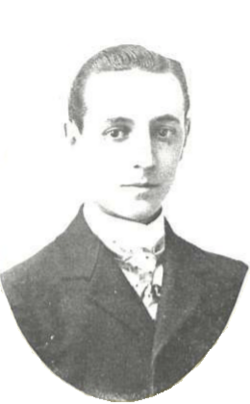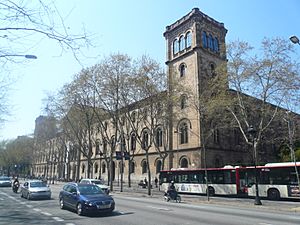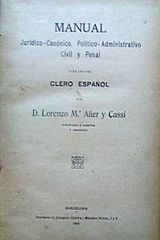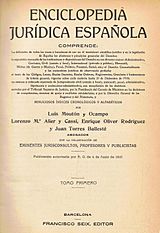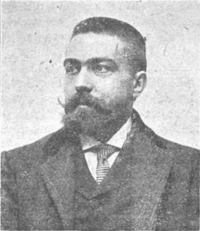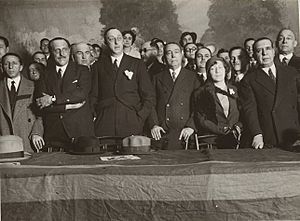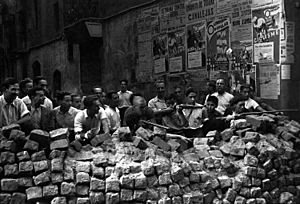Lorenzo Alier Cassi facts for kids
Quick facts for kids
Lorenzo Alier Cassi
|
|
|---|---|
|
|
|
| Born |
Lorenzo Alier Cassi
1878 Barcelona, Spain
|
| Died | 1942 Barcelona, Spain
|
| Nationality | Spanish |
| Occupation | lawyer, entrepreneur |
| Known for | politician |
| Political party | Comunión Tradicionalista |
Lorenzo María Alier Cassi (1878–1942) was a Spanish lawyer and politician from Catalonia. He was known for writing legal books and for leading the Barcelona Bar Association (Colegio de Abogados) from 1939 to 1942. In politics, he was a member of the Carlist movement his whole life. His political career had two important periods. From 1907 to 1910, he served in the Spanish Parliament (Cortes). Later, from 1934 to 1936, he led the Carlist group in Catalonia, called Comunión Tradicionalista.
Contents
Early Life and Family
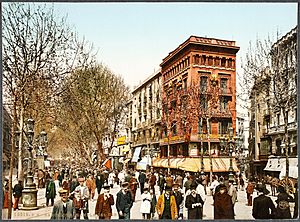
Lorenzo M. Alier Cassi came from a wealthy family in Catalonia. His grandfather, Lorenzo Alier, moved from Vich to Barcelona. He was a successful businessman who owned a metalworking company. This company made iron products and was very busy in the mid-1800s.
Lorenzo's father, Lorenzo Alier Sala (1845-1911), took over the family business. He was also very involved in the Carlist movement. This was a political group that supported a different royal family for Spain. He started a society and a newspaper to promote his ideas. He also served in the Carlist army during the Third Carlist War. After the war, he returned to Barcelona and became a high-ranking Carlist leader in Catalonia.
Lorenzo Alier Sala married María Gracia Cassí (died 1924). They had six children, and Lorenzo was the oldest. We don't know much about his early schooling. He studied law at the Barcelona University in the late 1890s. He became a lawyer in 1901 and started his legal career.
Lorenzo Alier Cassi married Rosa Espada y Bertrán (died 1926) before 1912. They lived in Barcelona and had seven children. Sadly, their third son died as a baby. Two of their older sons, Lorenzo and Antonio, were involved in Carlist politics. They lost their lives during the Spanish Civil War. Only their youngest son, José María, and their three daughters lived longer than their father.
Starting a Political Career
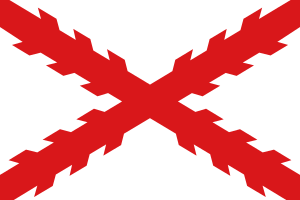
Lorenzo Alier Cassi grew up in a Carlist family. He learned his political beliefs from his father. He started getting involved in politics as a teenager. In 1898, he gave a speech at a Carlist meeting in Castellar del Vallés. By 1902, at just 24 years old, he became the secretary of the Carlist regional group in Catalonia. This put him right in the middle of regional politics.
In the mid-1900s, the Carlists in Catalonia joined forces with other political groups. This alliance was called Solidaritat Catalana. It was formed to oppose a new law that many people felt was unfair to Catalonia. In the 1907 elections, Alier Cassi was chosen to run for Parliament in Cervera. He won by a huge margin, getting almost all the votes.
As a member of Parliament, Alier was part of the 14-member Carlist group. He met important Carlist leaders from all over Spain. He also attended many Carlist events and rallies. In 1909, the Carlist leader in Catalonia, Erasmo Janer Gironella, made him a member of the regional board. It's possible that both he and his father served on the board at the same time. However, Alier Cassi was not deeply involved in politics. He focused more on his legal career. When his term in Parliament ended in 1910, he decided not to run again. This was the end of his time in Parliament.
Focus on Law and Business
After leaving Parliament, Alier continued his work as a lawyer in Barcelona. He became an expert in canon law, which is the law of the Catholic Church. In 1909, he wrote a popular textbook for Catholic clergy called Manual jurídico-canónico, político-administrativo, civil y penal.
In the early 1910s, he joined a group of lawyers who worked on a huge legal encyclopedia called Enciclopedia Jurídica Española. This publication had 30 volumes and covered all Spanish laws up to that time. It was updated for several years. In 1912, Alier earned his PhD in Law and Social Sciences in Madrid.
We don't have much information about Alier's activities in the late 1910s. He stayed involved in Carlist cultural events and sometimes spoke at their rallies. He was known as a respected lawyer in Barcelona. He also participated in religious ceremonies and charity work. For example, in 1920, he was the president of a group that organized free movie showings for children.
Besides his legal work, Alier also continued the family metalworking business. However, the business was struggling in the early 1920s. He tried to find new investors and partners, but it's unclear if these efforts worked. The metalworking company seems to have stopped operating by the mid-1920s. Alier also traveled to Cuba in the early 1920s, but we don't know why. There is very little information about him between 1924 and 1929.
Returning to Politics
Alier returned to politics in February 1931, joining the Carlist regional board. He wasn't very active at first. We don't know his opinions on big issues the party faced, like Catalan self-rule. However, some sources suggest he supported the views of the regional leader, Miguel Junyent. This approach was more moderate and avoided extreme actions.
In mid-1933, Junyent resigned because of strong opposition within the party. The Carlist leader, Alfonso Carlos, then appointed Alier as the new Carlist leader in Catalonia in March 1934.
During his time as leader, Alier had to reorganize the Carlist groups in Catalonia. This included integrating the Requeté, which was the Carlist militia (a kind of volunteer army). This was difficult, but Alier managed it with firm instructions. He also opposed any alliances with other monarchist groups, following the advice of another Carlist leader, Mauricio de Sivatte. Alier was more of an administrator than a strong leader. He mostly carried out the plans made by the national Carlist leader, Manuel Fal.
By late 1935, Alier was tired of the constant political struggles and resigned. The Carlist leader accepted his resignation but asked him to stay on until after the 1936 elections. Alier was also appointed to a new advisory group for the Carlist party. In February 1936, his resignation was made public, and Tomás Cayla replaced him as the Carlist leader in Catalonia.
Civil War and Later Life
Some historians believe Alier was involved in the Carlist plans against the Spanish Republic. After the February 1936 elections, he was reportedly in contact with military plotters. It's not clear what happened to him during the July Coup. His two sons were arrested, and a newspaper later mentioned that he "saw his son die." A vague report said Alier "miraculously escaped" death and hid in a village for most of the war until the Nationalist troops arrived.
In February 1939, after the Nationalists took over Catalonia, Alier was appointed dean of the Barcelona Bar Association. This was done by a fellow Carlist who was then the Nationalist minister of justice. There are different views on his actions in this role. Some studies say Alier approved purges (removals) of lawyers and helped build the new Francoist legal system. He created a special section for lawyers who had fought in the war, giving them privileges. He also issued rules stating that lawyers who supported democratic ideas should be removed. However, a newspaper from the 1950s claimed that justice was carried out calmly in the Bar Association, without revenge.
There is little information about Alier's activities after 1939. Some sources say he was deeply affected by the war and the loss of his two oldest sons. He did not return to political life. Besides his work at the Bar Association, he mostly attended religious events. He passed away in 1942, and his death was noted in a few newspapers in Barcelona and Madrid.
See also
 In Spanish: Lorenzo Alier y Cassi para niños
In Spanish: Lorenzo Alier y Cassi para niños


